高中英语精选语法知识单项选择题(word版含解析)
文档属性
| 名称 | 高中英语精选语法知识单项选择题(word版含解析) | 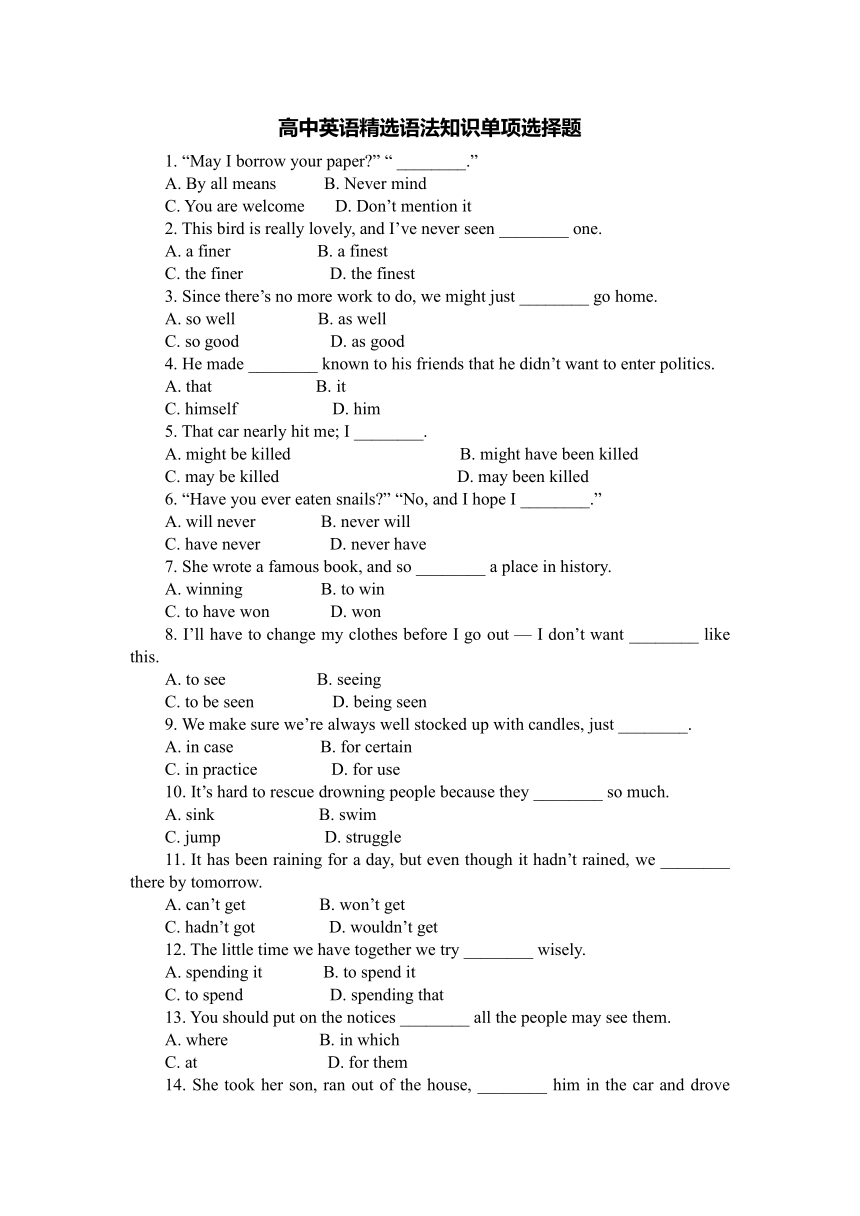 | |
| 格式 | doc | ||
| 文件大小 | 83.0KB | ||
| 资源类型 | 教案 | ||
| 版本资源 | 人教版(2019) | ||
| 科目 | 英语 | ||
| 更新时间 | 2021-05-29 23:33:58 | ||
图片预览

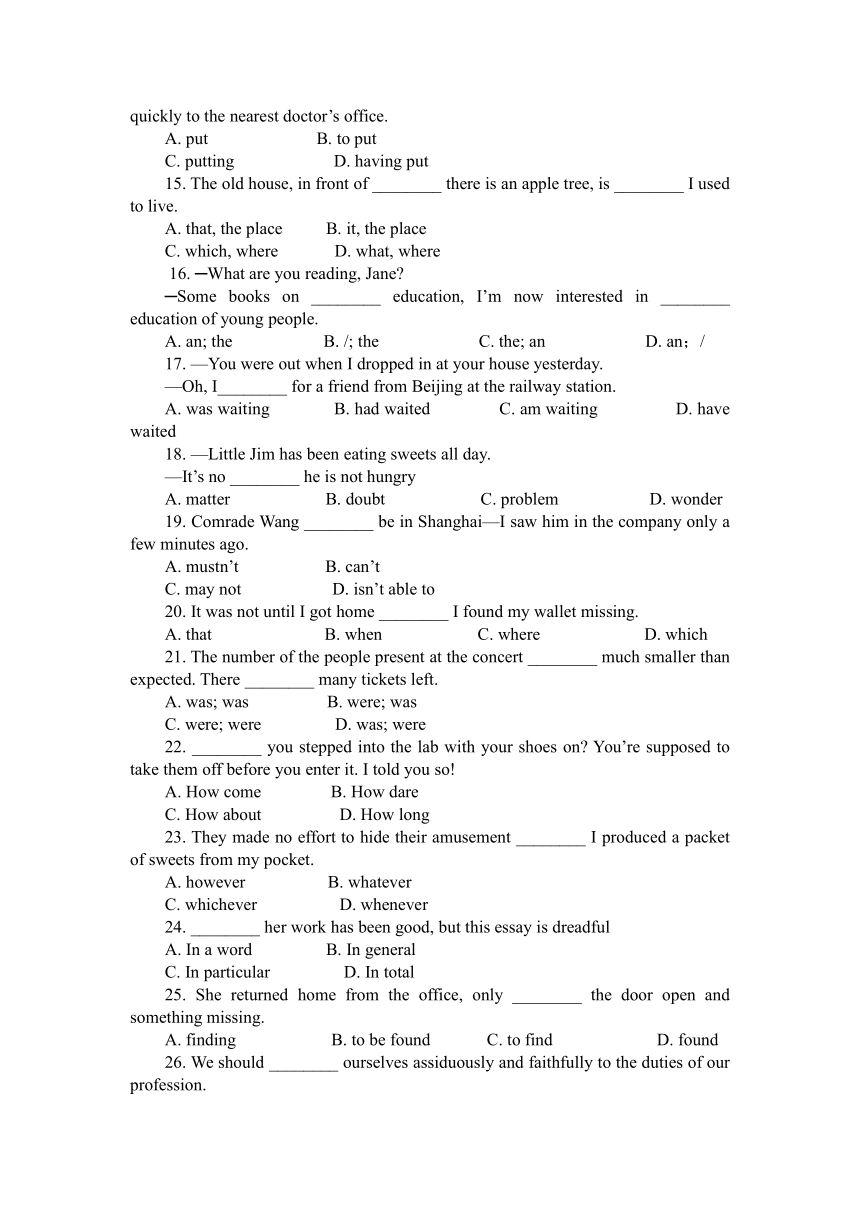
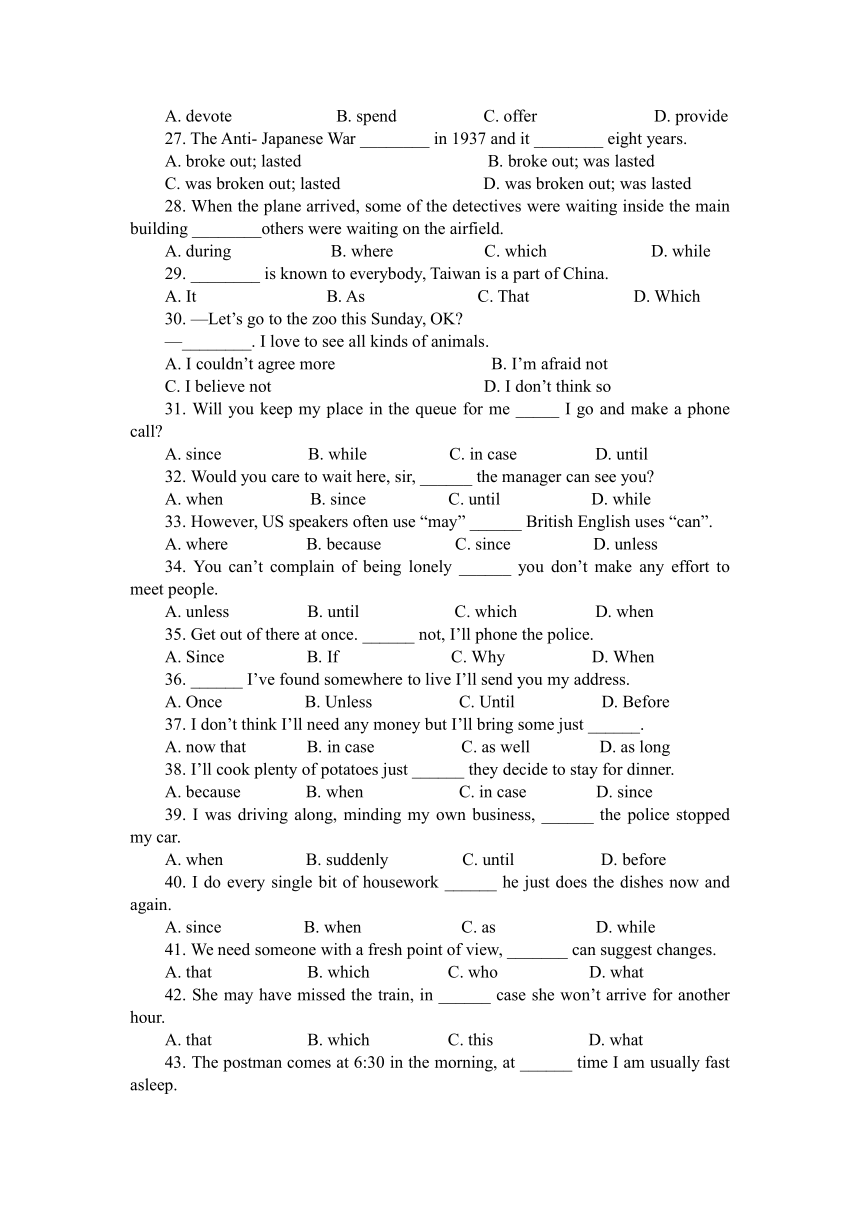
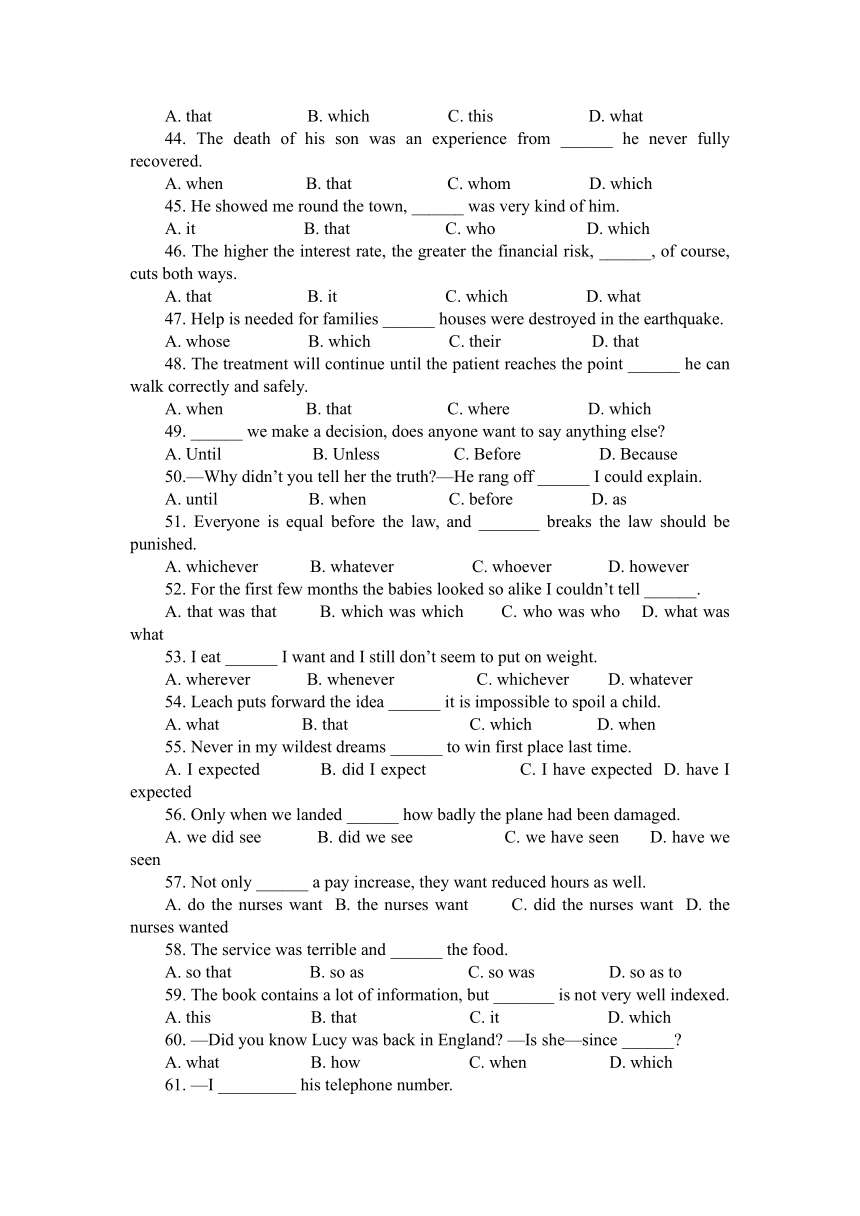
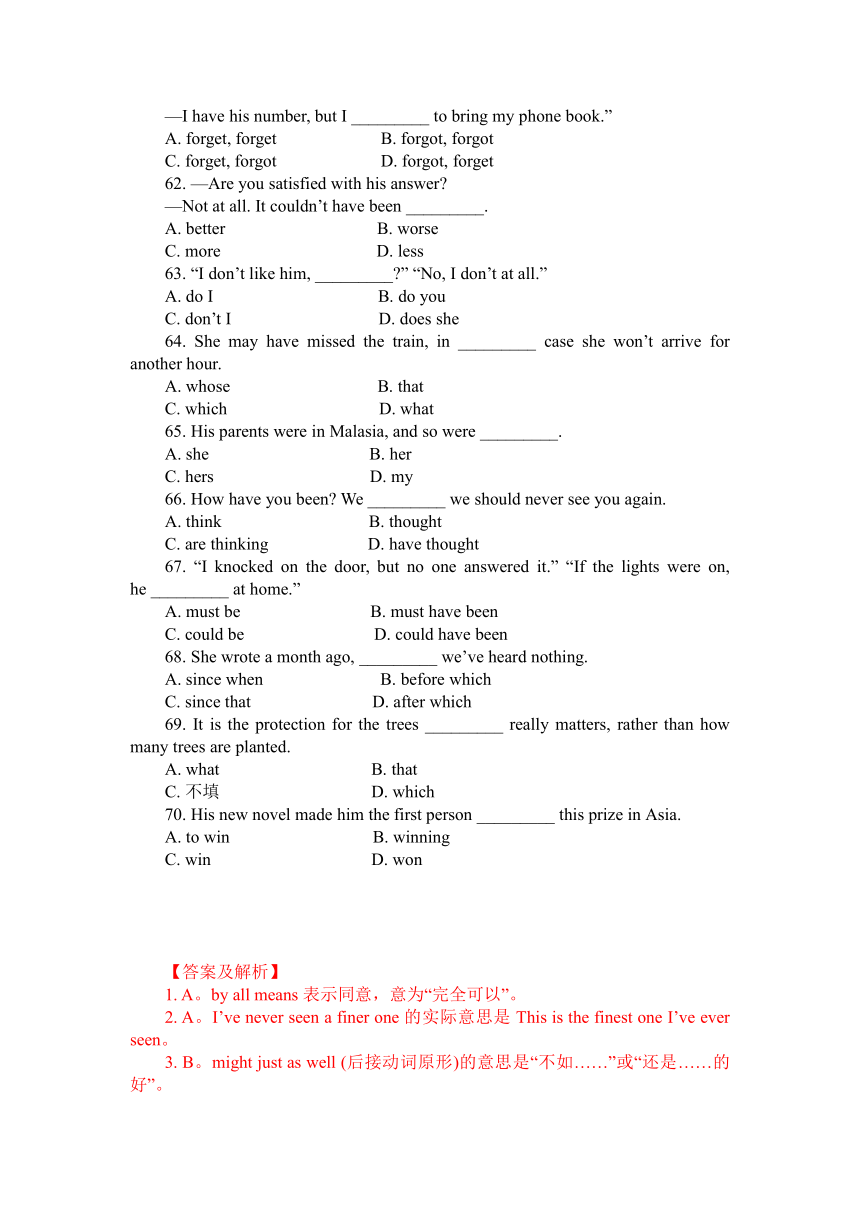
文档简介
高中英语精选语法知识单项选择题
1.
“May
I
borrow
your
paper?”
“
________.”
A.
By
all
means???????????B.
Never
mind??????????
C.
You
are
welcome???????D.
Don’t
mention
it
2.
This
bird
is
really
lovely,
and
I’ve
never
seen
________
one.
A.
a
finer????????????????????B.
a
finest????????????????
C.
the
finer????????????????????D.
the
finest
3.
Since
there’s
no
more
work
to
do,
we
might
just
________
go
home.
A.
so
well???????????????????B.
as
well????????????????
C.
so
good?????????????????????D.
as
good
4.
He
made
________
known
to
his
friends
that
he
didn’t
want
to
enter
politics.
A.
that??????????????????????
B.
it?????????????????????????
C.
himself??????????????????????D.
him
5.
That
car
nearly
hit
me;
I
________.
A.
might
be
killed???????????????????????????????????????B.
might
have
been
killed
C.
may
be
killed?????????????????????????????????????????D.
may
been
killed
6.
“Have
you
ever
eaten
snails?”
“No,
and
I
hope
I
________.”
A.
will
never???????????????B.
never
will?????????????
C.
have
never????????????????D.
never
have
7.
She
wrote
a
famous
book,
and
so
________
a
place
in
history.
A.
winning??????????????????B.
to
win?????????????????
C.
to
have
won??????????????D.
won
8.
I’ll
have
to
change
my
clothes
before
I
go
out
—
I
don’t
want
________
like
this.
A.
to
see?????????????????????B.
seeing????????????????
C.
to
be
seen??????????????????D.
being
seen
9.
We
make
sure
we’re
always
well
stocked
up
with
candles,
just
________.
A.
in
case????????????????????B.
for
certain???????????
C.
in
practice?????????????????D.
for
use
10.
It’s
hard
to
rescue
drowning
people
because
they
________
so
much.
A.
sink????????????????????????B.
swim??????????????????
C.
jump????????????????????????D.
struggle
11.
It
has
been
raining
for
a
day,
but
even
though
it
hadn’t
rained,
we
________
there
by
tomorrow.
A.
can’t
get?????????????????B.
won’t
get????????????
C.
hadn’t
got?????????????????D.
wouldn’t
get
12.
The
little
time
we
have
together
we
try
________
wisely.
A.
spending
it??????????????B.
to
spend
it??????????
C.
to
spend????????????????????D.
spending
that
13.
You
should
put
on
the
notices
________
all
the
people
may
see
them.
A.
where?????????????????????B.
in
which?????????????
C.
at??????????????????????????????D.
for
them
14.
She
took
her
son,
ran
out
of
the
house,
________
him
in
the
car
and
drove
quickly
to
the
nearest
doctor’s
office.
A.
put?????????????????????????B.
to
put?????????????????
C.
putting???????????????????????D.
having
put
15.
The
old
house,
in
front
of
________
there
is
an
apple
tree,
is
________
I
used
to
live.
A.
that,
the
place??????????B.
it,
the
place?????????
C.
which,
where?????????????D.
what,
where
?16.?─What
are
you
reading,
Jane?
─Some
books
on
________
education,
I’m
now
interested
in
________
education
of
young
people.
A.
an;
the?????????????????????B.
/;
the???????????????????????C.
the;
an???????????????????????D.
an;/
17.
—You
were
out
when
I
dropped
in
at
your
house
yesterday.
—Oh,
I________
for
a
friend
from
Beijing
at
the
railway
station.
A.
was
waiting??????????????B.
had
waited???????????????C.
am
waiting?????????????????D.
have
waited
18.
—Little
Jim
has
been
eating
sweets
all
day.
—It’s
no
________
he
is
not
hungry
A.
matter??????????????????????B.
doubt??????????????????????C.
problem?????????????????????D.
wonder
19.
Comrade
Wang
________
be
in
Shanghai—I
saw
him
in
the
company
only
a
few
minutes
ago.
A.
mustn’t????????????????????B.
can’t???????????????????????
C.
may
not?????????????????????D.
isn’t
able
to
20.
It
was
not
until
I
got
home
________
I
found
my
wallet
missing.
A.
that??????????????????????????B.
when??????????????????????C.
where????????????????????????D.
which
21.
The
number
of
the
people
present
at
the
concert
________
much
smaller
than
expected.
There
________
many
tickets
left.
A.
was;
was??????????????????B.
were;
was???????????????
C.
were;
were?????????????????D.
was;
were
22.
________
you
stepped
into
the
lab
with
your
shoes
on?
You’re
supposed
to
take
them
off
before
you
enter
it.
I
told
you
so!
A.
How
come????????????????B.
How
dare????????????????
C.
How
about??????????????????D.
How
long
23.
They
made
no
effort
to
hide
their
amusement
________
I
produced
a
packet
of
sweets
from
my
pocket.
A.
however???????????????????B.
whatever?????????????????
C.
whichever???????????????????D.
whenever
24.
________
her
work
has
been
good,
but
this
essay
is
dreadful
A.
In
a
word?????????????????B.
In
general????????????????
C.
In
particular?????????????????D.
In
total????????
25.
She
returned
home
from
the
office,
only
________
the
door
open
and
something
missing.
A.
finding??????????????????????B.
to
be
found?????????????C.
to
find????????????????????????D.
found
26.
We
should
________
ourselves
assiduously
and
faithfully
to
the
duties
of
our
profession.
A.
devote????????????????????????B.
spend????????????????????C.
offer????????????????????????
?D.
provide
27.
The
Anti-
Japanese
War
________
in
1937
and
it
________
eight
years.
A.
broke
out;
lasted???????????????????????????????????????
??B.
broke
out;
was
lasted
C.
was
broken
out;
lasted?????????????????????????????????D.
was
broken
out;
was
lasted
28.
When
the
plane
arrived,
some
of
the
detectives
were
waiting
inside
the
main
building
________others
were
waiting
on
the
airfield.
A.
during???????????????????????B.
where?????????????????????C.
which????????????????????????D.
while
29.
________
is
known
to
everybody,
Taiwan
is
a
part
of
China.
A.
It??????????????????????????????B.
As??????????????????????????C.
That????????????????????????D.
Which
30.
—Let’s
go
to
the
zoo
this
Sunday,
OK?
—________.
I
love
to
see
all
kinds
of
animals.
A.
I
couldn’t
agree
more????????????????????????????????????B.
I’m
afraid
not
C.
I
believe
not?????????????????????????????????????????????????D.
I
don’t
think
so
31.?Will
you
keep
my
place
in
the
queue
for
me
_____
I
go
and
make
a
phone
call?
A.?since????????????????????B.?while???????????????????C.?in
case??????????????????D.?until
32.?Would
you
care
to
wait
here,
sir,
______
the
manager
can
see
you?
A.?when????????????????????B.?since???????????????????C.?until?????????????????????D.?while
33.?However,
US
speakers
often
use
“may”
______
British
English
uses
“can”.
A.?where??????????????????B.?because?????????????????C.?since???????????????????D.?unless
34.?You
can’t
complain
of
being
lonely
______
you
don’t
make
any
effort
to
meet
people.
A.?unless??????????????????B.?until??????????????????????C.?which??????????????????D.?when
35.?Get
out
of
there
at
once.
______
not,
I’ll
phone
the
police.
A.?Since???????????????????B.?If??????????????????????????C.?Why????????????????????D.?When
36.?______
I’ve
found
somewhere
to
live
I’ll
send
you
my
address.
A.?Once???????????????????B.?Unless????????????????????C.?Until????????????????????D.?Before
37.?I
don’t
think
I’ll
need
any
money
but
I’ll
bring
some
just
______.
A.?now
that??????????????B.?in
case????????????????????C.?as
well????????????????D.?as
long
38.?I’ll
cook
plenty
of
potatoes
just
______
they
decide
to
stay
for
dinner.
A.?because???????????????B.?when??????????????????????C.?in
case????????????????D.?since
39.?I
was
driving
along,
minding
my
own
business,
______
the
police
stopped
my
car.
A.?when???????????????????B.?suddenly?????????????????C.?until????????????????????D.?before
40.?I
do
every
single
bit
of
housework
______
he
just
does
the
dishes
now
and
again.
A.?since???????????????????B.?when???????????????????????C.?as???????????????????????D.?while
41.?We
need
someone
with
a
fresh
point
of
view,
_______
can
suggest
changes.
A.?that??????????????????????B.?which??????????????????C.?who?????????????????????D.?what
42.?She
may
have
missed
the
train,
in
______
case
she
won’t
arrive
for
another
hour.
A.?that??????????????????????B.?which??????????????????C.?this??????????????????????D.?what
43.?The
postman
comes
at
6:30
in
the
morning,
at
______
time
I
am
usually
fast
asleep.
A.?that??????????????????????B.?which??????????????????C.?this??????????????????????D.?what
44.?The
death
of
his
son
was
an
experience
from
______
he
never
fully
recovered.
A.?when???????????????????B.?that??????????????????????C.?whom??????????????????D.?which
45.?He
showed
me
round
the
town,
______
was
very
kind
of
him.
A.?it?????????????????????????B.?that??????????????????????C.?who?????????????????????D.?which
46.?The
higher
the
interest
rate,
the
greater
the
financial
risk,
______,
of
course,
cuts
both
ways.
A.?that??????????????????????B.?it?????????????????????????C.?which??????????????????D.?what
47.?Help
is
needed
for
families
______
houses
were
destroyed
in
the
earthquake.
A.?whose??????????????????B.?which??????????????????C.?their?????????????????????D.?that
48.?The
treatment
will
continue
until
the
patient
reaches
the
point
______
he
can
walk
correctly
and
safely.
A.?when???????????????????B.?that??????????????????????C.?where??????????????????D.?which
49.?______
we
make
a
decision,
does
anyone
want
to
say
anything
else?
A.?Until?????????????????????B.?Unless?????????????????C.?Before??????????????????D.?Because
50.—Why
didn’t
you
tell
her
the
truth?—He
rang
off
______
I
could
explain.
A.?until?????????????????????B.?when???????????????????C.?before??????????????????D.?as
51.?Everyone
is
equal
before
the
law,
and
_______
breaks
the
law
should
be
punished.
A.?whichever????????????B.?whatever??????????????????C.?whoever?????????????D.?however
52.?For
the
first
few
months
the
babies
looked
so
alike
I
couldn’t
tell
______.
A.?that
was
that????????B.?which
was
which???????C.?who
was
who????D.?what
was
what
53.?I
eat
______
I
want
and
I
still
don’t
seem
to
put
on
weight.
A.?wherever?????????????B.?whenever???????????????????C.?whichever?????????D.?whatever
54.?Leach
puts
forward
the
idea
______
it
is
impossible
to
spoil
a
child.
A.?what???????????????????B.?that????????????????????????????C.?which???????????????D.?when
55.?Never
in
my
wildest
dreams
______
to
win
first
place
last
time.
A.?I
expected???????????B.?did
I
expect?????????????????C.?I
have
expected??D.?have
I
expected
56.?Only
when
we
landed
______
how
badly
the
plane
had
been
damaged.
A.?we
did
see???????????B.?did
we
see??????????????????C.?we
have
seen??????D.?have
we
seen
57.?Not
only
______
a
pay
increase,
they
want
reduced
hours
as
well.
A.?do
the
nurses
want??B.?the
nurses
want???????C.?did
the
nurses
want??D.?the
nurses
wanted
58.?The
service
was
terrible
and
______
the
food.
A.?so
that??????????????????B.?so
as????????????????????????C.?so
was?????????????????D.?so
as
to
59.?The
book
contains
a
lot
of
information,
but
_______
is
not
very
well
indexed.
A.?this???????????????????????B.?that??????????????????????????C.?it?????????????????????????D.?which
60.?—Did
you
know
Lucy
was
back
in?England?
—Is
she—since
______?
A.?what?????????????????????B.?how?????????????????????????C.?when???????????????????D.?which
61.?—I?_________?his
telephone
number.
—I
have
his
number,
but
I?_________?to
bring
my
phone
book.”
A.
forget,
forget????????????????????????B.
forgot,
forgot?
C.
forget,
forgot????????????????????????D.
forgot,
forget
62.?—Are
you
satisfied
with
his
answer?
—Not
at
all.
It
couldn’t
have
been?_________.
A.
better???????????????????????????????????B.
worse??????
C.
more????????????????????????????????????D.
less
63.?“I
don’t
like
him,?_________?”
“No,
I
don’t
at
all.”
A.
do
I??????????????????????????????????????B.
do
you?????
C.
don’t
I??????????????????????????????????D.
does
she
64.?She
may
have
missed
the
train,
in?_________?case
she
won’t
arrive
for
another
hour.
A.
whose??????????????????????????????????B.
that????????
C.
which???????????????????????????????????D.
what
65.?His
parents
were
in
Malasia,
and
so
were?_________.
A.
she?????????????????????????????????????B.
her???????
C.
hers????????????????????????????????????D.
my
66.?How
have
you
been?
We?_________?we
should
never
see
you
again.
A.
think??????????????????????????????????B.
thought????
C.
are
thinking???????????????????????D.
have
thought
67.?“I
knocked
on
the
door,
but
no
one
answered
it.”
“If
the
lights
were
on,
he?_________?at
home.”
A.
must
be??????????????????????????????B.
must
have
been
C.
could
be??????????????????????????????D.
could
have
been
68.?She
wrote
a
month
ago,?_________?we’ve
heard
nothing.
A.?since
when??????????????????
???????B.
before
which???????
C.
since
that????????????????????????????D.
after
which?
69.?It
is
the
protection
for
the
trees?_________?really
matters,
rather
than
how
many
trees
are
planted.
A.
what???????????????????????????????????B.
that?????????????????
C.?不填???????????????????????????????????D.
which
70.?His
new
novel
made
him
the
first
person?_________?this
prize
in?Asia.
A.
to
win?????????????????????????????????B.
winning???????????
C.
win?????????????????????????????????????D.
won
【答案及解析】
1.
A。by
all
means?表示同意,意为“完全可以”。
2.
A。I’ve
never
seen
a
finer
one?的实际意思是?This
is
the
finest
one
I’ve
ever
seen。
3.
B。might
just
as
well
(后接动词原形)的意思是“不如……”或“还是……的好”。
4.
B。it?为形式宾语,真正的宾语是?that
he
didn’t
want
to
enter
politics。
5.
B。表示过去可能发生而实际上未发生的事,用might+动词完成式。若只是推测过去可能的事,则可用?may
[might]
+?动词完成式,如?He
may
[might]
have
gone.?他可能已经走了。
6.
B。根据句意,填空处应用将来时态(实为将来时态的省略式);另外注意,频度副词本来通常置于助动词之后,但是若省略主要动词,即当频度副词和助动词置于句末时,应将频度副词置于助动词之前。
7.
D。and
so
won
a
place…可视为?and
so
he
won
a
place…之省略。
8.
C。want?表示“想要”时,其后通常接不定式,又由于主语与see?之间含有被动关系,故用被动式。
9.
A。in
case?在此表示“以防万一”。
10.
D。由句意和常识推知。
11.
A。we
can’t
get
there
by
tomorrow?为客观事实,故宜用陈述语气。
12.
C。该句的正常词序为?We
try
to
spend
the
little
time
we
have
together
wisely.
13.
A。where?指“在……的地方”,用以引导地点状语从句。
14.
A。句中四个动词为并列谓语,应时态一致(www.)。
15.
C。第一空应填?which,in
front
of
which
there
is
an
apple
tree?为修饰?the
old
house?的非限制性定语从句;第二空填?where,用以引导表语从句。
?16.
B。第一个?education?意为“教育;教育学”,为不可数名词,因此不用冠词;而第二个?education?表示特指,意为“年轻人的教育”,因此用定冠词,故答案为?B。
17.
A。根据上句中的时间状语的提示可知谓语动词是指过去某时正在发生的事情,因此用过去进行时态,故答案为?A。
18.
D。上句“小吉姆整天在吃糖果”是“他不饿”的原因,因此答案为?D。no
wonder?意为“难怪,不足为怪。”
19.
B。情态动词?must?表推测时只能用于肯定句。在否定句中用?can’t??代替must。can’t?意为“不可能”;may
not?意为“可能不”;be
able
to表示经过努力或克服了困难之后做成了某事的能力,意为“能,会”。句中的破折号起解释说明的作用。“我几分钟前在公司见过他”,因此“不可能在上海”,故答案为?B。
20.
A。强调句的基本结构由“It
is
/
was
+被强调部分?+
that
/
who
+?句子其余部分”组成,如果被强调的是人用?that?或?who;其他用?that。句意为:到了家我才发现我的钱包不见了。
21.
D。the
number
of?修饰可数名词复数作主语时,后面的谓语动词用单数形式;There
be?必须与后面的主语在人称和数上保持一致。tickets?为复数名词,因此用were。故答案为?D。
22.
A。how
come?意为“怎么”;how
dare?意为“怎敢”;how
about?意为“怎麽样”;how
long?意为“多久”。根据语境“怎么穿着鞋进了实验室?进来之前你该脱掉。我早告诉过你”可知答案为?A。
23.
D。此题考查?whenever?引导的时间状语从句。句意为“每当我从衣袋里拿出一包糖果的时候,他们毫不掩饰他们觉得好笑”。
24.
B。in
a
word?意为“总之”;in
general?意为“一般地;大体上;通常”;in
particular?意为“特别”;in
total?意为“整个地;总共”。根据句意“总的说来,她的作品不错,不过这篇文章糟透了”答案为?B。
25.
C。作结果状语时,不定式常表示没有预料到的情况或结果,即预料之外;而分词常表示一种自然而然的结果,即预料之中。根据语境“发现门开着,有东西丢了”是他没想到的,因此可知应用不定式。又因句子的主语?he?与动词?find是逻辑上的主谓关系,故用主动语态,因此答案为?C。
26.
A。devote…to?为习惯用语,意为“把……献给;把……专用于”。句意为“我们应当勤奋地而且忠诚地献身于我们的职责。”
27.
A。break
out?和?last?都是不及物动词,都不能用于被动语态,因此答案为?A。句意为“抗日战争?1937?年爆发,持续了八年。”
28.
D。while?作并列连词,表示对比或相反的情况,意为“而、却”。句意为“当飞机抵达时,一部分侦探等在主楼里面,而另一部分则等在停机坪上。”
29.
B。as?和?which?引导非限定性定语从句,都可以指整个句子,有时可以通用。但?as?引导的非限定性定语从句可以放在句首,也可以放在句中。which?只能放在句中。句意为“周所周知,台湾是中国的一部分。”
30.
A。上句提出建议“我们周日去动物园好吗?”根据答语中的后句“我喜欢看各种动物”可知是表示赞成对方的建议,故答案为?A。意为“我非常赞成。”
31.?B。从句意上看,只有while填入空格意思最通顺。while的意思是“当……的时候”。句意为:你能帮我占住队中的这个位子吗?我去打个电话就回来。
32.?C。until的意思是“直到”,同学们在做题时注意撇开句中的插入语sir。句意为:先生,经理要过一会儿才能见客,你能在这稍等片刻吗?
33.?C。where在此引导地点状语从句,其意为“在……的地方”。句意为:但是,在英国人用can的地方,美国人常用may。
34.?D。when在此表示“既然”,用于引导原因状语从句。又如:Why
do
you
want
a
new
job
when
you’ve
got
such
a
good
one
already??你已经有一份这么好的工作了,你为什么还要找新的工作呢?
35.?B。if
not为英语惯用表达,其意为“如果是那样的话”。又如:He
may
be
busy.
If
so,
I’ll
call
later.
If
not,
can
I
see
him
now??他可能忙,如是这样,我以后再来拜访。他如不忙,我现在可以见他吗?
36.?A。once在此表示条件,其意为“一旦”,句意为:我一旦找到住的地方,我就把地址发给你。
37.?B。in
case在此相当于一个副词的用法,其意为“以防万一”。又如:The
sun
is
shining,
but
I’ll
take
an
umbrella
just
in
case.?现在是晴天,但我还是带上雨伞以防万一。
38.?C。in
case在此引导目的状语从句,其意为“以防”。又如:Some
cyclists
carry
repair
outfits
in
case
they
have
a
puncture.?有些骑自行车的人携带修理工具,以备万一车胎被扎破。
39.?A。when在此表示“这时”“突然”,相当于并列连词。又如:The
children
were
playing
by
the
river
when
one
of
them
slipped
and
fell
in.?孩子们在河边玩耍,突然其中一个滑了一跤跌进河里。
40.?D。while在此表示转折,意为“而”,又如:Prices
are
rising
sharply,
while
incomes
are
lagging
far
behind.?物价飞涨而收入却远远落后。
41.?C。首先要注意,定语从句修饰的先行词是someone,不是view。当先行词指人时,要用who来引导定语从句,不能用which;而that虽然可用于指人,但不用于引导非限制性定语从句;至于what,它根本不是关系代词,不能引导定语从句。
42.?B。引导非限制性定语从句,表示类似this和that的含义,要用which。注意,如果在介词in的前面加上连词and,则此题要选that或this。
43.?B。引导非限制性定语从句,表示类似this和that的含义,要用关系代词which。注意,如果在介词at的前面加上连词and,则此题要选that或this。
44.?D。用于介词后引导定语从句时,要用关系代词which(指事物)或whom(指人)。
45.?D。引导非限制性定语从句且指事物时,要用关系代词which。
46.?C。引导非限制性定语从句且指事物时,要用关系代词which。注意句中的of
course为插入成分,若拿掉则为:The
higher
the
interest
rate,
the
greater
the
financial
risk,
______
cuts
both
ways.
47.?A。引导定语从句且在定语从句中作定语时,有两个关系代词可以用,一个是whose,一个是which。其中whose相当于one’s的意义,which相当于this或that的意思。
48.?C。先行词the
point相当于一个抽象的地点,其后要用where来引导定语从句,此时where在定语从句中用作状语。
49.?C。比较四个选项,只有before填入空格意思最通顺。before在此表示“在……之前”,句意为:在我们作出决定之前,还有谁有什么要补充的吗?
50.?C。before在此表示“不等……就”“还没有……就”,答句的意思是:我还没来得及解释,他就把电话挂上了。
51.?C。whoever在此引导主语从句,相当于anyone
who,其意为“无论谁”。全句意为:法律面前人人平等,无论谁违背法律都应受到惩罚。
52.?B。tell
which
is
which的意思是“分清哪个是哪个”。又如:The
twins
are
so
much
alike
that
I
can’t
tell
which
is
which.?这对双胞胎长得可真像,我都分不出谁是谁了。
53.?D。whatever在此引导宾语从句,用作动词eat的宾语;同时whatever在宾语从句中用作动词want的宾语,由于A和B具有副词性质,不能用作宾语,所以排除。再根据句意,只能选D不能选C。
54.?B。that在此引导同位语从句,修饰名词idea,表示idea的具体内容。
55.?B。由于never本身含有否定意义,所以当它位于句首时,其后要用部分倒装。又如:Never
in
history
had
technology
made
such
spectacular
advances.?历史上科技从未有过这样神奇的进展。
56.?B。按英语习惯,当“only+状语”位于句首时,其后的句子要用部分倒装。句意为:我们只是在着陆之后才看到飞机损坏的严重程度。又如:Only
if
a
teacher
has
given
permission
is
a
student
allowed
to
enter
this
room.?只有得到教师的允许,学生才可以进这间屋。
57.?A。根据英语语法,当not
only…but
(also)…结构的not
only…位于句首时,其后的句子要用倒装语序。又如:Not
only
has
she
been
late
three
times,
but
she
has
also
done
no
work.?她不仅仅迟到了三次;她还没干一点活。
58.?C。当要表示后面所描述的肯定情况与前面的肯定情况一样时,英语习惯上用“so+助动词(连系动词be)+主语”这样的倒装句式,通常译为“……也一样”。又如:My
brother
was
taught
to
read
by
my
mother,
and
similarly,
so
was
I.?我的兄弟认字是母亲教的,同样,我也是。
59.?C。it在此用于指代前面提到的book或information。又如:The
content
of
your
essay
is
excellent,
but
it’s
not
very
well
expressed.?你那篇文章的内容好极了,但是表达方式不太好。
60.?C。Is
she—since
when?是一种省略的表达,补充完整即为:Is
she
back
in?England?
Since
when
has
she
been
back??类似的又如:I’ve
got
a
new
job.—Since
when??我有了份新工作。——什么时候开始的?
61.分析:此题容易误选A,认为“忘记”是现在的事。仔细体会一下对话的语境:第一个人说“我忘记他的电话号码了”,这个“忘记”应该是现在的事,即现在忘记了,要不然就没有必要同对方说此话了,故第一空应填?forget;第二个人说“我有他的号码,但我忘记带电话本了”,这个“忘记”应该是过去的事,即过去忘记带电话本,所以现在电话本不在身上(注意句中的转折连词?but),故第二空应填?forgot。请再看一例:
—Oh,
I?_________?where
he
lives.
—Don’t
you
carry
your
address
book?
—No,
I?_________?to
bring
it.
A.?forget,
forget??????????????????????????B.?forgot,
forgot?
C.?forget,
forgot??????????????????????????D.?forgot,
forget
答案选C,理由同上。
62.分析:此题最佳答案为B,关键是要理解?Not
at
all?的意思。根据上文语境,Not
at
all?为?I
am
not
satisfied
at
all
with
his
answer?之省略,即表示“我对他的回答一点也不满意”,既然如此,他的回答当然会是?couldn’t
have
been
worse(不可能更糟)。值得注意的是,完成式的否定式与比较级连用有时可以表示最高级的意思,请看下面一道题:
How
beautifully
she
sings!
I
have
never
heard?_________?voice.
A.?a
better??????????????????????????????????B.?a
best????
C.?the
better???????????????????????????????D.?the
best
此题容易误选D,认为最高级前用定冠词才是最佳的。其实此题最佳答案为A,该句可视为是下面这句的省略形式:…I
have
never
heard
a
better
voice
than
her
voice.?全句句意为“她唱得多好啊!我从未听过她这么好的声音”。请再看几个例子:
He
is
fine,
never
better.?他很好,比以往任何时候都好。
I've
never
seen
a
finer
bird.?我从未见过比这更美的鸟。
I’ve
never
found
a
better
job.?这是我找到的最好的工作。
63.分析:此题容易误选A,认为这是一个普通的反意疑问句:陈述部分主语为I,疑问部分主语也应是I;陈述部分为否定式,所以疑问部分要用肯定式。做此题的关键是要看下文的语境,下文说“No,
I
don’t
at
all.”(不,我一点也不喜欢),这表明前一句是在询问对方的看法,所以此题的最佳答案应是B,它是?do
you
like
him??的省略形式,全句意为:我不喜欢他,你呢(你喜欢他吗)??请再看一个类似的例子:
“Alice,
you
feed
the
bird
today,?_________?”
“But
I
fed
it
yesterday.”
A.?do
you???????????????????????????????????B.?will
you????
C.?didn’t
you??????????????????????????????D.?don’t
you
此题容易误选D,与上题一样,认为这是一个普通的反意疑问句。此题的下文语境“But
I
fed
it
yesterday”(但是我昨天才喂过鸟)很重要,它表明上文是在要求对方去“喂鸟”。另外,前一句中的称呼语?Alice?也是一个重要的信息,联系此信息和下文语境,我们可断定?you
feed
the
bird
today?是一个带有主语的祈使句,所以此题的最佳答案应是B。
64.分析:此题容易误选?A,因为许多同学认为在定语从句中能用作定语的关系代词只有?whose。其实除?whose?可用作定语外,which?也可用作定语,只是含义上有差别:在此情况下,whose?的意思相当于?one’s,而?which?的意思则相当于?that?或?this。比较:
This
is
Mary,
whose
[=
and
her]
father
we
met
last
week.
Call
again
at
11,
by
which
time
[=
and
by
that
time]
the
meeting
should
be
over.
注:若上面一题中的逗号前有连词?and,也可选?B(that)。请再看下面一道类似的考题:
You
can
get
there
by
plane
or
by
boat,
but
in?_________?case
it’s
very
expensive.
A.?which???????????????????????????????????B.?this??????
C.?any???????????????????????????????????????D.?either
首先应排除选项A,因为句中有并列连词?but;选B也不对,因为?this?是表示“确定”含义的,它与前面的?by
plane
or
by
boat?这种不确定性不相符;选项C也不行,因为?any?是表示三者或三者以上的情形,而?by
plane
or
by
boat?只有两种选择。故答案选D,either?表示“两者中任意之一”。
65.分析:此题答案选C。hers在此相当于her
parents。句意为“他的父母在马来西亚,我的父母也在马来西亚”。注意,此题还可以下面这样的形式进行考查(答案选C):
His
parents
were
in
Malasia,
and
so_________?hers.
A.?was?????????????????????????????????????B.?is???????
C.?were????????????????????????????????????D.?did
66.分析:此题答案选B。前面说“你近来怎么样?”,说明两人已经见了面,后面说“我们以为再不会见到你了”,这显然应是过去的看法,故用一般过去时。
?67.分析:此题答案选B。根据对话中的时态可知,所谈论情况发生在过去,也就是说空格处是对过去情况的推测,故情态动词后要接动词完成式。
68.分析:此题答案选A,其中when?相当于?a
month
ago。若改为?and
since
then?也不可以。类似地下面一题也选A:
He
hid
himself
behind
the
tree,?_________he
could
see
what
the
man
would
do.
A.?from
where??????????????????????????B.?from
which
C.?under
where?????????????????????????D.?under
which
69.分析:此题答案选B,句子其实是一个强调句,强调主语。此句还原成非强调句即为:The
protection
for
the
trees
really
matters,
rather
than
how
many
trees
are
planted.?请再看下面一个类似的例子:
It
was
what
he
meant
rather
than
what
he
said?_________?annoyed
me.
A.?which??????????????????????????????????B.?as????????????????????
C.?what????????????????????????????????????D.?that
此题也是一个强调句型,空格处应填?that
(即选D),被强调成分为?what
he
meant
rather
than
what
he
said。句意为:让我生气的不是他说的话,而是他话中的意思。
70.分析:此题答案选A,但很容易误选C,因为受句中使役动词make的影响,误认为其后的win
the
this
prize?为宾语补足语。其实使役动词的宾语补足语应是the
first
person,其后的to
win
this
prize?为修饰the
first
person的定语,故用不定式。
1.
“May
I
borrow
your
paper?”
“
________.”
A.
By
all
means???????????B.
Never
mind??????????
C.
You
are
welcome???????D.
Don’t
mention
it
2.
This
bird
is
really
lovely,
and
I’ve
never
seen
________
one.
A.
a
finer????????????????????B.
a
finest????????????????
C.
the
finer????????????????????D.
the
finest
3.
Since
there’s
no
more
work
to
do,
we
might
just
________
go
home.
A.
so
well???????????????????B.
as
well????????????????
C.
so
good?????????????????????D.
as
good
4.
He
made
________
known
to
his
friends
that
he
didn’t
want
to
enter
politics.
A.
that??????????????????????
B.
it?????????????????????????
C.
himself??????????????????????D.
him
5.
That
car
nearly
hit
me;
I
________.
A.
might
be
killed???????????????????????????????????????B.
might
have
been
killed
C.
may
be
killed?????????????????????????????????????????D.
may
been
killed
6.
“Have
you
ever
eaten
snails?”
“No,
and
I
hope
I
________.”
A.
will
never???????????????B.
never
will?????????????
C.
have
never????????????????D.
never
have
7.
She
wrote
a
famous
book,
and
so
________
a
place
in
history.
A.
winning??????????????????B.
to
win?????????????????
C.
to
have
won??????????????D.
won
8.
I’ll
have
to
change
my
clothes
before
I
go
out
—
I
don’t
want
________
like
this.
A.
to
see?????????????????????B.
seeing????????????????
C.
to
be
seen??????????????????D.
being
seen
9.
We
make
sure
we’re
always
well
stocked
up
with
candles,
just
________.
A.
in
case????????????????????B.
for
certain???????????
C.
in
practice?????????????????D.
for
use
10.
It’s
hard
to
rescue
drowning
people
because
they
________
so
much.
A.
sink????????????????????????B.
swim??????????????????
C.
jump????????????????????????D.
struggle
11.
It
has
been
raining
for
a
day,
but
even
though
it
hadn’t
rained,
we
________
there
by
tomorrow.
A.
can’t
get?????????????????B.
won’t
get????????????
C.
hadn’t
got?????????????????D.
wouldn’t
get
12.
The
little
time
we
have
together
we
try
________
wisely.
A.
spending
it??????????????B.
to
spend
it??????????
C.
to
spend????????????????????D.
spending
that
13.
You
should
put
on
the
notices
________
all
the
people
may
see
them.
A.
where?????????????????????B.
in
which?????????????
C.
at??????????????????????????????D.
for
them
14.
She
took
her
son,
ran
out
of
the
house,
________
him
in
the
car
and
drove
quickly
to
the
nearest
doctor’s
office.
A.
put?????????????????????????B.
to
put?????????????????
C.
putting???????????????????????D.
having
put
15.
The
old
house,
in
front
of
________
there
is
an
apple
tree,
is
________
I
used
to
live.
A.
that,
the
place??????????B.
it,
the
place?????????
C.
which,
where?????????????D.
what,
where
?16.?─What
are
you
reading,
Jane?
─Some
books
on
________
education,
I’m
now
interested
in
________
education
of
young
people.
A.
an;
the?????????????????????B.
/;
the???????????????????????C.
the;
an???????????????????????D.
an;/
17.
—You
were
out
when
I
dropped
in
at
your
house
yesterday.
—Oh,
I________
for
a
friend
from
Beijing
at
the
railway
station.
A.
was
waiting??????????????B.
had
waited???????????????C.
am
waiting?????????????????D.
have
waited
18.
—Little
Jim
has
been
eating
sweets
all
day.
—It’s
no
________
he
is
not
hungry
A.
matter??????????????????????B.
doubt??????????????????????C.
problem?????????????????????D.
wonder
19.
Comrade
Wang
________
be
in
Shanghai—I
saw
him
in
the
company
only
a
few
minutes
ago.
A.
mustn’t????????????????????B.
can’t???????????????????????
C.
may
not?????????????????????D.
isn’t
able
to
20.
It
was
not
until
I
got
home
________
I
found
my
wallet
missing.
A.
that??????????????????????????B.
when??????????????????????C.
where????????????????????????D.
which
21.
The
number
of
the
people
present
at
the
concert
________
much
smaller
than
expected.
There
________
many
tickets
left.
A.
was;
was??????????????????B.
were;
was???????????????
C.
were;
were?????????????????D.
was;
were
22.
________
you
stepped
into
the
lab
with
your
shoes
on?
You’re
supposed
to
take
them
off
before
you
enter
it.
I
told
you
so!
A.
How
come????????????????B.
How
dare????????????????
C.
How
about??????????????????D.
How
long
23.
They
made
no
effort
to
hide
their
amusement
________
I
produced
a
packet
of
sweets
from
my
pocket.
A.
however???????????????????B.
whatever?????????????????
C.
whichever???????????????????D.
whenever
24.
________
her
work
has
been
good,
but
this
essay
is
dreadful
A.
In
a
word?????????????????B.
In
general????????????????
C.
In
particular?????????????????D.
In
total????????
25.
She
returned
home
from
the
office,
only
________
the
door
open
and
something
missing.
A.
finding??????????????????????B.
to
be
found?????????????C.
to
find????????????????????????D.
found
26.
We
should
________
ourselves
assiduously
and
faithfully
to
the
duties
of
our
profession.
A.
devote????????????????????????B.
spend????????????????????C.
offer????????????????????????
?D.
provide
27.
The
Anti-
Japanese
War
________
in
1937
and
it
________
eight
years.
A.
broke
out;
lasted???????????????????????????????????????
??B.
broke
out;
was
lasted
C.
was
broken
out;
lasted?????????????????????????????????D.
was
broken
out;
was
lasted
28.
When
the
plane
arrived,
some
of
the
detectives
were
waiting
inside
the
main
building
________others
were
waiting
on
the
airfield.
A.
during???????????????????????B.
where?????????????????????C.
which????????????????????????D.
while
29.
________
is
known
to
everybody,
Taiwan
is
a
part
of
China.
A.
It??????????????????????????????B.
As??????????????????????????C.
That????????????????????????D.
Which
30.
—Let’s
go
to
the
zoo
this
Sunday,
OK?
—________.
I
love
to
see
all
kinds
of
animals.
A.
I
couldn’t
agree
more????????????????????????????????????B.
I’m
afraid
not
C.
I
believe
not?????????????????????????????????????????????????D.
I
don’t
think
so
31.?Will
you
keep
my
place
in
the
queue
for
me
_____
I
go
and
make
a
phone
call?
A.?since????????????????????B.?while???????????????????C.?in
case??????????????????D.?until
32.?Would
you
care
to
wait
here,
sir,
______
the
manager
can
see
you?
A.?when????????????????????B.?since???????????????????C.?until?????????????????????D.?while
33.?However,
US
speakers
often
use
“may”
______
British
English
uses
“can”.
A.?where??????????????????B.?because?????????????????C.?since???????????????????D.?unless
34.?You
can’t
complain
of
being
lonely
______
you
don’t
make
any
effort
to
meet
people.
A.?unless??????????????????B.?until??????????????????????C.?which??????????????????D.?when
35.?Get
out
of
there
at
once.
______
not,
I’ll
phone
the
police.
A.?Since???????????????????B.?If??????????????????????????C.?Why????????????????????D.?When
36.?______
I’ve
found
somewhere
to
live
I’ll
send
you
my
address.
A.?Once???????????????????B.?Unless????????????????????C.?Until????????????????????D.?Before
37.?I
don’t
think
I’ll
need
any
money
but
I’ll
bring
some
just
______.
A.?now
that??????????????B.?in
case????????????????????C.?as
well????????????????D.?as
long
38.?I’ll
cook
plenty
of
potatoes
just
______
they
decide
to
stay
for
dinner.
A.?because???????????????B.?when??????????????????????C.?in
case????????????????D.?since
39.?I
was
driving
along,
minding
my
own
business,
______
the
police
stopped
my
car.
A.?when???????????????????B.?suddenly?????????????????C.?until????????????????????D.?before
40.?I
do
every
single
bit
of
housework
______
he
just
does
the
dishes
now
and
again.
A.?since???????????????????B.?when???????????????????????C.?as???????????????????????D.?while
41.?We
need
someone
with
a
fresh
point
of
view,
_______
can
suggest
changes.
A.?that??????????????????????B.?which??????????????????C.?who?????????????????????D.?what
42.?She
may
have
missed
the
train,
in
______
case
she
won’t
arrive
for
another
hour.
A.?that??????????????????????B.?which??????????????????C.?this??????????????????????D.?what
43.?The
postman
comes
at
6:30
in
the
morning,
at
______
time
I
am
usually
fast
asleep.
A.?that??????????????????????B.?which??????????????????C.?this??????????????????????D.?what
44.?The
death
of
his
son
was
an
experience
from
______
he
never
fully
recovered.
A.?when???????????????????B.?that??????????????????????C.?whom??????????????????D.?which
45.?He
showed
me
round
the
town,
______
was
very
kind
of
him.
A.?it?????????????????????????B.?that??????????????????????C.?who?????????????????????D.?which
46.?The
higher
the
interest
rate,
the
greater
the
financial
risk,
______,
of
course,
cuts
both
ways.
A.?that??????????????????????B.?it?????????????????????????C.?which??????????????????D.?what
47.?Help
is
needed
for
families
______
houses
were
destroyed
in
the
earthquake.
A.?whose??????????????????B.?which??????????????????C.?their?????????????????????D.?that
48.?The
treatment
will
continue
until
the
patient
reaches
the
point
______
he
can
walk
correctly
and
safely.
A.?when???????????????????B.?that??????????????????????C.?where??????????????????D.?which
49.?______
we
make
a
decision,
does
anyone
want
to
say
anything
else?
A.?Until?????????????????????B.?Unless?????????????????C.?Before??????????????????D.?Because
50.—Why
didn’t
you
tell
her
the
truth?—He
rang
off
______
I
could
explain.
A.?until?????????????????????B.?when???????????????????C.?before??????????????????D.?as
51.?Everyone
is
equal
before
the
law,
and
_______
breaks
the
law
should
be
punished.
A.?whichever????????????B.?whatever??????????????????C.?whoever?????????????D.?however
52.?For
the
first
few
months
the
babies
looked
so
alike
I
couldn’t
tell
______.
A.?that
was
that????????B.?which
was
which???????C.?who
was
who????D.?what
was
what
53.?I
eat
______
I
want
and
I
still
don’t
seem
to
put
on
weight.
A.?wherever?????????????B.?whenever???????????????????C.?whichever?????????D.?whatever
54.?Leach
puts
forward
the
idea
______
it
is
impossible
to
spoil
a
child.
A.?what???????????????????B.?that????????????????????????????C.?which???????????????D.?when
55.?Never
in
my
wildest
dreams
______
to
win
first
place
last
time.
A.?I
expected???????????B.?did
I
expect?????????????????C.?I
have
expected??D.?have
I
expected
56.?Only
when
we
landed
______
how
badly
the
plane
had
been
damaged.
A.?we
did
see???????????B.?did
we
see??????????????????C.?we
have
seen??????D.?have
we
seen
57.?Not
only
______
a
pay
increase,
they
want
reduced
hours
as
well.
A.?do
the
nurses
want??B.?the
nurses
want???????C.?did
the
nurses
want??D.?the
nurses
wanted
58.?The
service
was
terrible
and
______
the
food.
A.?so
that??????????????????B.?so
as????????????????????????C.?so
was?????????????????D.?so
as
to
59.?The
book
contains
a
lot
of
information,
but
_______
is
not
very
well
indexed.
A.?this???????????????????????B.?that??????????????????????????C.?it?????????????????????????D.?which
60.?—Did
you
know
Lucy
was
back
in?England?
—Is
she—since
______?
A.?what?????????????????????B.?how?????????????????????????C.?when???????????????????D.?which
61.?—I?_________?his
telephone
number.
—I
have
his
number,
but
I?_________?to
bring
my
phone
book.”
A.
forget,
forget????????????????????????B.
forgot,
forgot?
C.
forget,
forgot????????????????????????D.
forgot,
forget
62.?—Are
you
satisfied
with
his
answer?
—Not
at
all.
It
couldn’t
have
been?_________.
A.
better???????????????????????????????????B.
worse??????
C.
more????????????????????????????????????D.
less
63.?“I
don’t
like
him,?_________?”
“No,
I
don’t
at
all.”
A.
do
I??????????????????????????????????????B.
do
you?????
C.
don’t
I??????????????????????????????????D.
does
she
64.?She
may
have
missed
the
train,
in?_________?case
she
won’t
arrive
for
another
hour.
A.
whose??????????????????????????????????B.
that????????
C.
which???????????????????????????????????D.
what
65.?His
parents
were
in
Malasia,
and
so
were?_________.
A.
she?????????????????????????????????????B.
her???????
C.
hers????????????????????????????????????D.
my
66.?How
have
you
been?
We?_________?we
should
never
see
you
again.
A.
think??????????????????????????????????B.
thought????
C.
are
thinking???????????????????????D.
have
thought
67.?“I
knocked
on
the
door,
but
no
one
answered
it.”
“If
the
lights
were
on,
he?_________?at
home.”
A.
must
be??????????????????????????????B.
must
have
been
C.
could
be??????????????????????????????D.
could
have
been
68.?She
wrote
a
month
ago,?_________?we’ve
heard
nothing.
A.?since
when??????????????????
???????B.
before
which???????
C.
since
that????????????????????????????D.
after
which?
69.?It
is
the
protection
for
the
trees?_________?really
matters,
rather
than
how
many
trees
are
planted.
A.
what???????????????????????????????????B.
that?????????????????
C.?不填???????????????????????????????????D.
which
70.?His
new
novel
made
him
the
first
person?_________?this
prize
in?Asia.
A.
to
win?????????????????????????????????B.
winning???????????
C.
win?????????????????????????????????????D.
won
【答案及解析】
1.
A。by
all
means?表示同意,意为“完全可以”。
2.
A。I’ve
never
seen
a
finer
one?的实际意思是?This
is
the
finest
one
I’ve
ever
seen。
3.
B。might
just
as
well
(后接动词原形)的意思是“不如……”或“还是……的好”。
4.
B。it?为形式宾语,真正的宾语是?that
he
didn’t
want
to
enter
politics。
5.
B。表示过去可能发生而实际上未发生的事,用might+动词完成式。若只是推测过去可能的事,则可用?may
[might]
+?动词完成式,如?He
may
[might]
have
gone.?他可能已经走了。
6.
B。根据句意,填空处应用将来时态(实为将来时态的省略式);另外注意,频度副词本来通常置于助动词之后,但是若省略主要动词,即当频度副词和助动词置于句末时,应将频度副词置于助动词之前。
7.
D。and
so
won
a
place…可视为?and
so
he
won
a
place…之省略。
8.
C。want?表示“想要”时,其后通常接不定式,又由于主语与see?之间含有被动关系,故用被动式。
9.
A。in
case?在此表示“以防万一”。
10.
D。由句意和常识推知。
11.
A。we
can’t
get
there
by
tomorrow?为客观事实,故宜用陈述语气。
12.
C。该句的正常词序为?We
try
to
spend
the
little
time
we
have
together
wisely.
13.
A。where?指“在……的地方”,用以引导地点状语从句。
14.
A。句中四个动词为并列谓语,应时态一致(www.)。
15.
C。第一空应填?which,in
front
of
which
there
is
an
apple
tree?为修饰?the
old
house?的非限制性定语从句;第二空填?where,用以引导表语从句。
?16.
B。第一个?education?意为“教育;教育学”,为不可数名词,因此不用冠词;而第二个?education?表示特指,意为“年轻人的教育”,因此用定冠词,故答案为?B。
17.
A。根据上句中的时间状语的提示可知谓语动词是指过去某时正在发生的事情,因此用过去进行时态,故答案为?A。
18.
D。上句“小吉姆整天在吃糖果”是“他不饿”的原因,因此答案为?D。no
wonder?意为“难怪,不足为怪。”
19.
B。情态动词?must?表推测时只能用于肯定句。在否定句中用?can’t??代替must。can’t?意为“不可能”;may
not?意为“可能不”;be
able
to表示经过努力或克服了困难之后做成了某事的能力,意为“能,会”。句中的破折号起解释说明的作用。“我几分钟前在公司见过他”,因此“不可能在上海”,故答案为?B。
20.
A。强调句的基本结构由“It
is
/
was
+被强调部分?+
that
/
who
+?句子其余部分”组成,如果被强调的是人用?that?或?who;其他用?that。句意为:到了家我才发现我的钱包不见了。
21.
D。the
number
of?修饰可数名词复数作主语时,后面的谓语动词用单数形式;There
be?必须与后面的主语在人称和数上保持一致。tickets?为复数名词,因此用were。故答案为?D。
22.
A。how
come?意为“怎么”;how
dare?意为“怎敢”;how
about?意为“怎麽样”;how
long?意为“多久”。根据语境“怎么穿着鞋进了实验室?进来之前你该脱掉。我早告诉过你”可知答案为?A。
23.
D。此题考查?whenever?引导的时间状语从句。句意为“每当我从衣袋里拿出一包糖果的时候,他们毫不掩饰他们觉得好笑”。
24.
B。in
a
word?意为“总之”;in
general?意为“一般地;大体上;通常”;in
particular?意为“特别”;in
total?意为“整个地;总共”。根据句意“总的说来,她的作品不错,不过这篇文章糟透了”答案为?B。
25.
C。作结果状语时,不定式常表示没有预料到的情况或结果,即预料之外;而分词常表示一种自然而然的结果,即预料之中。根据语境“发现门开着,有东西丢了”是他没想到的,因此可知应用不定式。又因句子的主语?he?与动词?find是逻辑上的主谓关系,故用主动语态,因此答案为?C。
26.
A。devote…to?为习惯用语,意为“把……献给;把……专用于”。句意为“我们应当勤奋地而且忠诚地献身于我们的职责。”
27.
A。break
out?和?last?都是不及物动词,都不能用于被动语态,因此答案为?A。句意为“抗日战争?1937?年爆发,持续了八年。”
28.
D。while?作并列连词,表示对比或相反的情况,意为“而、却”。句意为“当飞机抵达时,一部分侦探等在主楼里面,而另一部分则等在停机坪上。”
29.
B。as?和?which?引导非限定性定语从句,都可以指整个句子,有时可以通用。但?as?引导的非限定性定语从句可以放在句首,也可以放在句中。which?只能放在句中。句意为“周所周知,台湾是中国的一部分。”
30.
A。上句提出建议“我们周日去动物园好吗?”根据答语中的后句“我喜欢看各种动物”可知是表示赞成对方的建议,故答案为?A。意为“我非常赞成。”
31.?B。从句意上看,只有while填入空格意思最通顺。while的意思是“当……的时候”。句意为:你能帮我占住队中的这个位子吗?我去打个电话就回来。
32.?C。until的意思是“直到”,同学们在做题时注意撇开句中的插入语sir。句意为:先生,经理要过一会儿才能见客,你能在这稍等片刻吗?
33.?C。where在此引导地点状语从句,其意为“在……的地方”。句意为:但是,在英国人用can的地方,美国人常用may。
34.?D。when在此表示“既然”,用于引导原因状语从句。又如:Why
do
you
want
a
new
job
when
you’ve
got
such
a
good
one
already??你已经有一份这么好的工作了,你为什么还要找新的工作呢?
35.?B。if
not为英语惯用表达,其意为“如果是那样的话”。又如:He
may
be
busy.
If
so,
I’ll
call
later.
If
not,
can
I
see
him
now??他可能忙,如是这样,我以后再来拜访。他如不忙,我现在可以见他吗?
36.?A。once在此表示条件,其意为“一旦”,句意为:我一旦找到住的地方,我就把地址发给你。
37.?B。in
case在此相当于一个副词的用法,其意为“以防万一”。又如:The
sun
is
shining,
but
I’ll
take
an
umbrella
just
in
case.?现在是晴天,但我还是带上雨伞以防万一。
38.?C。in
case在此引导目的状语从句,其意为“以防”。又如:Some
cyclists
carry
repair
outfits
in
case
they
have
a
puncture.?有些骑自行车的人携带修理工具,以备万一车胎被扎破。
39.?A。when在此表示“这时”“突然”,相当于并列连词。又如:The
children
were
playing
by
the
river
when
one
of
them
slipped
and
fell
in.?孩子们在河边玩耍,突然其中一个滑了一跤跌进河里。
40.?D。while在此表示转折,意为“而”,又如:Prices
are
rising
sharply,
while
incomes
are
lagging
far
behind.?物价飞涨而收入却远远落后。
41.?C。首先要注意,定语从句修饰的先行词是someone,不是view。当先行词指人时,要用who来引导定语从句,不能用which;而that虽然可用于指人,但不用于引导非限制性定语从句;至于what,它根本不是关系代词,不能引导定语从句。
42.?B。引导非限制性定语从句,表示类似this和that的含义,要用which。注意,如果在介词in的前面加上连词and,则此题要选that或this。
43.?B。引导非限制性定语从句,表示类似this和that的含义,要用关系代词which。注意,如果在介词at的前面加上连词and,则此题要选that或this。
44.?D。用于介词后引导定语从句时,要用关系代词which(指事物)或whom(指人)。
45.?D。引导非限制性定语从句且指事物时,要用关系代词which。
46.?C。引导非限制性定语从句且指事物时,要用关系代词which。注意句中的of
course为插入成分,若拿掉则为:The
higher
the
interest
rate,
the
greater
the
financial
risk,
______
cuts
both
ways.
47.?A。引导定语从句且在定语从句中作定语时,有两个关系代词可以用,一个是whose,一个是which。其中whose相当于one’s的意义,which相当于this或that的意思。
48.?C。先行词the
point相当于一个抽象的地点,其后要用where来引导定语从句,此时where在定语从句中用作状语。
49.?C。比较四个选项,只有before填入空格意思最通顺。before在此表示“在……之前”,句意为:在我们作出决定之前,还有谁有什么要补充的吗?
50.?C。before在此表示“不等……就”“还没有……就”,答句的意思是:我还没来得及解释,他就把电话挂上了。
51.?C。whoever在此引导主语从句,相当于anyone
who,其意为“无论谁”。全句意为:法律面前人人平等,无论谁违背法律都应受到惩罚。
52.?B。tell
which
is
which的意思是“分清哪个是哪个”。又如:The
twins
are
so
much
alike
that
I
can’t
tell
which
is
which.?这对双胞胎长得可真像,我都分不出谁是谁了。
53.?D。whatever在此引导宾语从句,用作动词eat的宾语;同时whatever在宾语从句中用作动词want的宾语,由于A和B具有副词性质,不能用作宾语,所以排除。再根据句意,只能选D不能选C。
54.?B。that在此引导同位语从句,修饰名词idea,表示idea的具体内容。
55.?B。由于never本身含有否定意义,所以当它位于句首时,其后要用部分倒装。又如:Never
in
history
had
technology
made
such
spectacular
advances.?历史上科技从未有过这样神奇的进展。
56.?B。按英语习惯,当“only+状语”位于句首时,其后的句子要用部分倒装。句意为:我们只是在着陆之后才看到飞机损坏的严重程度。又如:Only
if
a
teacher
has
given
permission
is
a
student
allowed
to
enter
this
room.?只有得到教师的允许,学生才可以进这间屋。
57.?A。根据英语语法,当not
only…but
(also)…结构的not
only…位于句首时,其后的句子要用倒装语序。又如:Not
only
has
she
been
late
three
times,
but
she
has
also
done
no
work.?她不仅仅迟到了三次;她还没干一点活。
58.?C。当要表示后面所描述的肯定情况与前面的肯定情况一样时,英语习惯上用“so+助动词(连系动词be)+主语”这样的倒装句式,通常译为“……也一样”。又如:My
brother
was
taught
to
read
by
my
mother,
and
similarly,
so
was
I.?我的兄弟认字是母亲教的,同样,我也是。
59.?C。it在此用于指代前面提到的book或information。又如:The
content
of
your
essay
is
excellent,
but
it’s
not
very
well
expressed.?你那篇文章的内容好极了,但是表达方式不太好。
60.?C。Is
she—since
when?是一种省略的表达,补充完整即为:Is
she
back
in?England?
Since
when
has
she
been
back??类似的又如:I’ve
got
a
new
job.—Since
when??我有了份新工作。——什么时候开始的?
61.分析:此题容易误选A,认为“忘记”是现在的事。仔细体会一下对话的语境:第一个人说“我忘记他的电话号码了”,这个“忘记”应该是现在的事,即现在忘记了,要不然就没有必要同对方说此话了,故第一空应填?forget;第二个人说“我有他的号码,但我忘记带电话本了”,这个“忘记”应该是过去的事,即过去忘记带电话本,所以现在电话本不在身上(注意句中的转折连词?but),故第二空应填?forgot。请再看一例:
—Oh,
I?_________?where
he
lives.
—Don’t
you
carry
your
address
book?
—No,
I?_________?to
bring
it.
A.?forget,
forget??????????????????????????B.?forgot,
forgot?
C.?forget,
forgot??????????????????????????D.?forgot,
forget
答案选C,理由同上。
62.分析:此题最佳答案为B,关键是要理解?Not
at
all?的意思。根据上文语境,Not
at
all?为?I
am
not
satisfied
at
all
with
his
answer?之省略,即表示“我对他的回答一点也不满意”,既然如此,他的回答当然会是?couldn’t
have
been
worse(不可能更糟)。值得注意的是,完成式的否定式与比较级连用有时可以表示最高级的意思,请看下面一道题:
How
beautifully
she
sings!
I
have
never
heard?_________?voice.
A.?a
better??????????????????????????????????B.?a
best????
C.?the
better???????????????????????????????D.?the
best
此题容易误选D,认为最高级前用定冠词才是最佳的。其实此题最佳答案为A,该句可视为是下面这句的省略形式:…I
have
never
heard
a
better
voice
than
her
voice.?全句句意为“她唱得多好啊!我从未听过她这么好的声音”。请再看几个例子:
He
is
fine,
never
better.?他很好,比以往任何时候都好。
I've
never
seen
a
finer
bird.?我从未见过比这更美的鸟。
I’ve
never
found
a
better
job.?这是我找到的最好的工作。
63.分析:此题容易误选A,认为这是一个普通的反意疑问句:陈述部分主语为I,疑问部分主语也应是I;陈述部分为否定式,所以疑问部分要用肯定式。做此题的关键是要看下文的语境,下文说“No,
I
don’t
at
all.”(不,我一点也不喜欢),这表明前一句是在询问对方的看法,所以此题的最佳答案应是B,它是?do
you
like
him??的省略形式,全句意为:我不喜欢他,你呢(你喜欢他吗)??请再看一个类似的例子:
“Alice,
you
feed
the
bird
today,?_________?”
“But
I
fed
it
yesterday.”
A.?do
you???????????????????????????????????B.?will
you????
C.?didn’t
you??????????????????????????????D.?don’t
you
此题容易误选D,与上题一样,认为这是一个普通的反意疑问句。此题的下文语境“But
I
fed
it
yesterday”(但是我昨天才喂过鸟)很重要,它表明上文是在要求对方去“喂鸟”。另外,前一句中的称呼语?Alice?也是一个重要的信息,联系此信息和下文语境,我们可断定?you
feed
the
bird
today?是一个带有主语的祈使句,所以此题的最佳答案应是B。
64.分析:此题容易误选?A,因为许多同学认为在定语从句中能用作定语的关系代词只有?whose。其实除?whose?可用作定语外,which?也可用作定语,只是含义上有差别:在此情况下,whose?的意思相当于?one’s,而?which?的意思则相当于?that?或?this。比较:
This
is
Mary,
whose
[=
and
her]
father
we
met
last
week.
Call
again
at
11,
by
which
time
[=
and
by
that
time]
the
meeting
should
be
over.
注:若上面一题中的逗号前有连词?and,也可选?B(that)。请再看下面一道类似的考题:
You
can
get
there
by
plane
or
by
boat,
but
in?_________?case
it’s
very
expensive.
A.?which???????????????????????????????????B.?this??????
C.?any???????????????????????????????????????D.?either
首先应排除选项A,因为句中有并列连词?but;选B也不对,因为?this?是表示“确定”含义的,它与前面的?by
plane
or
by
boat?这种不确定性不相符;选项C也不行,因为?any?是表示三者或三者以上的情形,而?by
plane
or
by
boat?只有两种选择。故答案选D,either?表示“两者中任意之一”。
65.分析:此题答案选C。hers在此相当于her
parents。句意为“他的父母在马来西亚,我的父母也在马来西亚”。注意,此题还可以下面这样的形式进行考查(答案选C):
His
parents
were
in
Malasia,
and
so_________?hers.
A.?was?????????????????????????????????????B.?is???????
C.?were????????????????????????????????????D.?did
66.分析:此题答案选B。前面说“你近来怎么样?”,说明两人已经见了面,后面说“我们以为再不会见到你了”,这显然应是过去的看法,故用一般过去时。
?67.分析:此题答案选B。根据对话中的时态可知,所谈论情况发生在过去,也就是说空格处是对过去情况的推测,故情态动词后要接动词完成式。
68.分析:此题答案选A,其中when?相当于?a
month
ago。若改为?and
since
then?也不可以。类似地下面一题也选A:
He
hid
himself
behind
the
tree,?_________he
could
see
what
the
man
would
do.
A.?from
where??????????????????????????B.?from
which
C.?under
where?????????????????????????D.?under
which
69.分析:此题答案选B,句子其实是一个强调句,强调主语。此句还原成非强调句即为:The
protection
for
the
trees
really
matters,
rather
than
how
many
trees
are
planted.?请再看下面一个类似的例子:
It
was
what
he
meant
rather
than
what
he
said?_________?annoyed
me.
A.?which??????????????????????????????????B.?as????????????????????
C.?what????????????????????????????????????D.?that
此题也是一个强调句型,空格处应填?that
(即选D),被强调成分为?what
he
meant
rather
than
what
he
said。句意为:让我生气的不是他说的话,而是他话中的意思。
70.分析:此题答案选A,但很容易误选C,因为受句中使役动词make的影响,误认为其后的win
the
this
prize?为宾语补足语。其实使役动词的宾语补足语应是the
first
person,其后的to
win
this
prize?为修饰the
first
person的定语,故用不定式。
